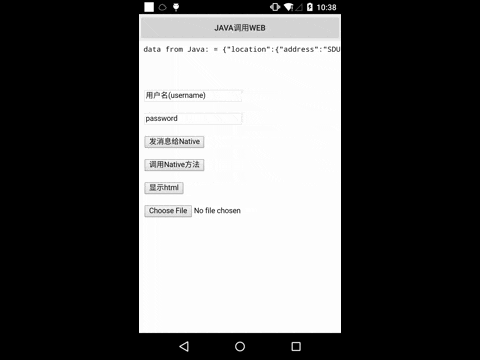Advanced Webview 


Latest Version v1.7.0
Feature list
- handler Google SSL alert #2
- no more memory leak issue in video iframe
- easy web page margin fixed
- easy web video implementation
- easy web content display implementation
- took care of life cycle issues
- fantasy animation reveal fade in
-
UriFactoryset -
Fx9Cset -
In32set -
CommentBoxUrlresolve facebook, weibo, popbee comment issues - Support Post Method
- support sound cloud
- extra js script runtime
- JsBridge integration, make a bridge between Java and JavaScript.
- Youtube dialog display with material design.
- Support inject additional CSS for webview load. (use HBCart client)
Download for the Sample APK
For initiating a webview, simply thing to do this to do it once for all.
Remote Repo
repositories {
maven {
url "http://dl.bintray.com/jjhesk/maven"
}
}
Dependency
compile 'com.hkm.ezwebview:ezwebviewv:1.7.0'Step 1.
please locate in the xml for the video display
<RelativeLayout
android:id="@+id/framevideoplayer"
android:layout_width="match_parent"
android:layout_height="@dimen/item_height_video"
android:background="@color/main_background"
android:padding="1dp"
android:visibility="gone">
<com.hkm.ezwebview.webviewleakfix.NonLeakingWebView
android:id="@+id/videoplayer"
android:layout_width="match_parent"
android:layout_height="wrap_content"
android:layout_centerInParent="true"
android:background="@color/main_background"
android:visibility="gone" />
<com.lsjwzh.widget.materialloadingprogressbar.CircleProgressBar
xmlns:fab="http://schemas.android.com/apk/res-auto"
android:id="@+id/progressloadingbarpx"
android:layout_width="wrap_content"
android:layout_height="wrap_content"
android:layout_centerInParent="true"
fab:mlpb_enable_circle_background="true"
fab:mlpb_inner_radius="18dp"
fab:mlpb_progress_color="@color/second_grey_bg"
fab:mlpb_show_arrow="false" />
</RelativeLayout>if you need to start a content display for html please also specify the xml as below:
<RelativeLayout
android:id="@+id/content_article_frame"
android:layout_width="match_parent"
android:layout_height="wrap_content"
android:layout_marginBottom="10dp"
android:layout_marginLeft="10dp"
android:layout_marginRight="10dp"
android:visibility="gone">
<com.hkm.ezwebview.webviewleakfix.NonLeakingWebView
android:id="@+id/content_block"
android:layout_width="match_parent"
android:layout_height="match_parent"
android:visibility="gone"
tool:ignore="WebViewLayout" />
</RelativeLayout>HTML content display area
======= This is the fast simple implementation without any callbacks:
@Override
public void onViewCreated(View v, Bundle b) {
initBinding(v);
final String contentc = fromFileRaw(getActivity(), R.raw.sample_html);
try {
Fx9C.setup_content_block_wb(this, content_article_frame, block, contentc);
}
catch (Exception e) {
e.printStackTrace();
}
// if (bloadlistenr != null)
//
bloadlistenr.onLoad();
}
This is the advanced implementation:
@Override
public void onViewCreated(View v, Bundle b) {
initBinding(v);
final String contentc = fromFileRaw(getActivity(), R.raw.sample_html);
try {
Fx9C.setup_content_block_wb(this, content_article_frame, block, contentc, new HClient.Callback() {
@Override
public void retrieveCookie(String cookie_string) {
}
}
, new Runnable() {
@Override
public void run() {
ViewCompat.animate(mprogressbar).alpha(0f).withEndAction(new Runnable() {
@Override
public void run() {
mprogressbar.setVisibility(View.GONE);
}
}
);
}
}
);
}
catch (Exception e) {
e.printStackTrace();
}
// if (bloadlistenr != null)
//
bloadlistenr.onLoad();
}
After enhancement
Video embeded content display area
=======
try {
CircleProgressBar bprogressbar = (CircleProgressBar)this.findViewById(R.id.progressloadingbarpx);
Fx9C.setup_web_video(
this,
video_frame,
mVideo,
bprogressbar,
video_embed_code_webvoew,
new HClient.Callback() {
@Override
public void startNewActivity(String s, String s1, String s2, Context context) {
}
@Override
public void startFeedList(String s, Context context) {
}
@Override
public void openUri(String s, Context context) {
}
@Override
public void retrieveCookie(String s) {
}
}
, null);
}
catch (Exception e) {
e.printStackTrace();
}
Register a Java handler function so that js can call
webView.registerHandler("submitFromWeb", new BridgeHandler() {
@Override
public void handler(String data, CallBackFunction function) {
Log.i(TAG, "handler = submitFromWeb, data from web = " + data);
function.onCallBack("submitFromWeb exe, response data from Java");
}
}
);
js can call this Java handler method "submitFromWeb" through:
WebViewJavascriptBridge.callHandler(
'submitFromWeb'
, {
'param': str1
}
, function(responseData) {
document.getElementById("show").innerHTML = "send get responseData from java, data = " + responseData
}
);
You can set a default handler in Java, so that js can send message to Java without assigned handlerName
webView.setDefaultHandler(new DefaultHandler());
window.WebViewJavascriptBridge.send(
data
, function(responseData) {
document.getElementById("show").innerHTML = "repsonseData from java, data = " + responseData
}
);
Register a JavaScript handler function so that Java can call
WebViewJavascriptBridge.registerHandler("functionInJs", function(data, responseCallback) {
document.getElementById("show").innerHTML = ("data from Java: = " + data);
var responseData = "Javascript Says Right back aka!";
responseCallback(responseData);
}
);
Java can call this js handler function "functionInJs" through:
webView.callHandler("functionInJs", new Gson().toJson(user), new CallBackFunction() {
@Override
public void onCallBack(String data) {
}
}
);
You can also define a default handler use init method, so that Java can send message to js without assigned handlerName
for example:
bridge.init(function(message, responseCallback) {
console.log('JS got a message', message);
var data = {
'Javascript Responds': 'Wee!'
}
;
console.log('JS responding with', data);
responseCallback(data);
}
);
webView.send("hello");
will print 'JS got a message hello' and 'JS responding with' in webview console.
Notice
This lib will inject a WebViewJavascriptBridge Object to window object. So in your js, before use WebViewJavascriptBridge, you must detect if WebViewJavascriptBridge exist. If WebViewJavascriptBridge does not exit, you can listen to WebViewJavascriptBridgeReady event, as the blow code shows:
if (window.WebViewJavascriptBridge) {
//do your work here
}
else {
document.addEventListener(
'WebViewJavascriptBridgeReady'
, function() {
//do your work here
}
,
false
);
}
Dialog webview implementation
For fragment that uses support.v4 package: The youtube video ID will be taken in place
EzWebDialogNonLeakv4.newInstanceYoutube("_Oh9oSZSUbQ").show(getFragmentManager());
For normal support:
EzWebDialogNonLeak.newInstanceYoutube("_Oh9oSZSUbQ").show(getFragmentManager());
Thank you for your support and we will bring more amazing libraries to your productive works. We are accepting bitcoin by the address as below. Please scan the QR code to start
License
Copyright 2015 jjHESK, HKM UNITED Licensed under the Apache License, Version 2.0 (the "License");
you may not use this file except in compliance with the License. You may obtain a copy of the License at
http://www.apache.org/licenses/LICENSE-2.0 Unless required by applicable law or agreed to in writing, software distributed under the License is distributed on an "AS IS" BASIS, WITHOUT WARRANTIES OR CONDITIONS OF ANY KIND, either express or implied. See the License for the specific language governing permissions and limitations under the License. 

